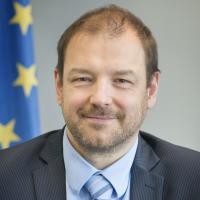How do you see the future energy system and which challenges are of key concern to European TSOs?
»The future energy system needs to address the 4D's: Decarbonisation, Digitalisation, Decentralisation and Democratisation. All of these dimensions stand on their own but are very interlinked. Decarbonisation will not be achieved without putting the customer at the centre and allow distributed flexibility to be valued on all markets. Digitalisation is a means to making the active customer and flexible era happen. So all dimensions are important in the end and Europe is quite well placed on all of these.
Through the implementation of network codes ENTSO-E is for example implementing a new IT strategy mainly centered around the common grid model that will facilitate data exchange across the whole of Europe. The Clean Energy Package is also showing in the right direction for more customer participation.«
What about the energy flexibility challenge? How will it evolve in the next 10 to 15 years, if the share of variable renewables in the electricity production mix will continue to rise?
»The key challenge will be to adapt the power system functioning and the market design so as to foster the use of distributed flexibility. This will require new applications in system operation, planning, transaction orchestration. This is where digital has a great role to play.
A key element is to allow flexibility to flow through the system and be used where it adds most value. We hope the regulatory framework will not block flexibility at the TSO/DSO interface. And data exchange between the two parts of the system is definitely the next challenge. ENTSO-E and European associations of DSOs (Distribution System Operators) are actively working on this.«
The end-consumers also play an increasingly important role. Why and how can the TSOs and other players in the energy arena manage that challenge?
»Because of their neutrality, their helicopter view of the system, their balancing and market facilitation experience, TSOs have a leading role to play in making this transition happen. They will have to strengthen their cooperation with DSOs but also with other stakeholders. But they have all in hand to drive the change here.«
Is there a need for internal TSO transformation as a consequence of disruptive new grid technologies?
»As other actors in the power system the TSOs too have to adapt to rapid changes in technology, IT, consumer expectations, and political evolutions. Like all businesses they need to become more and more agile without losing their expertise in risk preparedness which we all greatly rely on to keep our power supply safe.
The TSOs are evolving to better serve the grid users and society in general. Having a regulatory environment that supports this evolution is key. The current regulatory regime is no longer adapted to the needs for important IT investments for example.«
What about the TSO/DSO relationship from the energy flexibility market development perspective? What has to be changed in this relationship?
»There is a need for closer cooperation, new interfaces and data platforms. There is an increasing emphasis on better understanding each other’s challenges through the European TSO/DSO platform. Also, it is important to find ways to co-optimise the system and the distributed flexibility so that grid tariffs are as fair for the consumers as possible.«
Which are the most obvious compromises that will have to be reached by both parties, TSOs and DSOs to develop a long-term successful cooperation?
»The platform has already published common guided principles and results will be disseminated as work progresses. This area of cooptimisation is new in many ways so there is a need to study and understand each other’s constraints. But the will is certainly there to find the best solution for the grid users and flexibility providers.«
What about the importance of active consumers for the whole system? Do the consumers need to be educated and empowered to responsibly and boldly play their future role?
»Customers are getting more and more informed and empowered. In some European countries, for example Estonia, Finland and Denmark, active customers are already a reality. There will be for sure intermediaries, service providers, different offers for different profiles and needs and different interfaces. The expectation is there, the technology also. It is more about adapting the market design, system operation and regulation to make it happen all over Europe. At ENTSO-E we are also attentive to interoperability of systems across countries so as to not create new barriers in Europe. Through ENTSO-E our members are sharing knowledge and solutions.«
Is ENTSO-E also active in the field of raising awareness among prosumers?
»It is more for our members to decide on who ENTSO-E’s target audiences are. We are involved in a series of initiatives that go beyond our traditional communities. We want to work with startups like we did for the European Electricity Map with Tomorrow, we want to develop partnerships with international organisations and we were at the COP23 and had the Clean Energy Ministerial at our event. One of our future energy scenarios is looking into Global Climate Action.
We are developing partnerships with academia such as the Florence School of Regulation that developed an online course on the European network codes. We may want to further expand to reach out to the flexibility ecosystem as we believe that network codes are technical guidelines for the energy transition.
Our Assembly is looking into a new strategy for the association that touches upon all these challenges. The strategy should be finalised in the first quarter of 2018.«
This interview is originally published on the Slovene power sector web portal Naš stik.
Mr. Schmitt interviewed by: Mojca Drevenšek, Consensus Communications and EN‑LITE Society.
The future role of TSOs is explained in iEnergija by Mr. Jurij Klančnik and Mr. Darko Kramar (both from ELES). See the topic here (in Slovene only) and in the interview with both ELES experts here (in Slovene only).




